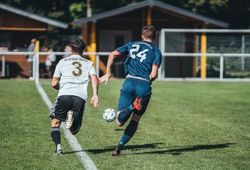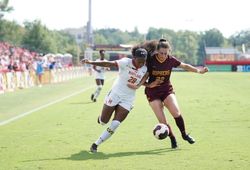You’ve likely seen the highlights, followed your favourite college teams on social media, and imagined yourself stepping onto a pitch in the USA, ready to make your mark. While the dream of playing college soccer is exciting, the reality of a season can be a whirlwind of new experiences. But what does the actual season look like? And how does it compare to the traditional football calendar you're used to?
With the 2025 season having just kicked off, now is the perfect time to give you a detailed look into how it all works and what you can truly expect from this incredible journey. This guide is designed to improve your understanding of the season timelines and get you ready for the intensity and excitement of the American college soccer season when its your turn to head Stateside.
Timeline: A Whirlwind Fall!
Unlike the UK and European football calendars, which typically span from August to May, the U.S. college soccer season is packed almost entirely into the Fall semester—from August to December. This condensed format means high intensity, frequent matches, and little downtime. It may be full on, but it’s an incredibly rewarding experience, as you kick off your US college soccer journey.
Pre-Season: Hit the Ground Running!
Imagine arriving in late July or early August, fresh off the plane, and diving straight into pre-season. This isn't a gentle introduction; it's a full-on boot camp designed to get you physically and tactically ready for the demanding schedule ahead. Think daily double sessions, fitness tests, team bonding, and understanding your coach's philosophy. This period is crucial for showcasing your abilities and securing your spot.
The Regular Season: Game On!
The regular season typically kicks off in late August and runs into early November. This is where the rubber meets the road! You can expect to play at least two matches per week, often one midweek and one on the weekend. This could mean playing Friday and Sunday, or Tuesday and Saturday – it’s a relentless schedule that demands peak physical condition, mental resilience and the ability to balance your academics, often while you’re on the road.
Post-Season: Championship Dreams!
For teams that perform well, the season extends into November and December with conference tournaments and the coveted NCAA National Tournament. This is where the stakes are highest, and teams battle it out for ultimate glory and the status of conference and national champions.
Reaching the "NCAA National Tournament" is the goal for every program and offers an incredible experience, from the joys of the Sweet 16 and into the last four itself, The College Cup.
|
Phase |
Timeline |
Details |
|
Pre-Season |
Late July – Mid August |
Double sessions, fitness tests, tactical prep, team bonding |
|
Regular Season |
Mid August – Early Nov |
2 matches/week, academic balance, travel, squad competition |
|
Conference Playoffs |
Early – Mid November |
Top teams compete for automatic NCAA bids |
|
NCAA Tournament |
Mid Nov – Mid Dec |
Knockout format, national exposure, College Cup finals |
Click here to view an example of an NCAA D1 Men's Soccer Program schedule.
This Season’s National Tournament Finals Schedule
Men’s D1: University of North Carolina, Chapel Hill, 12 & 15 December
Women’s D1: University of Kansas, 5 & 8 December
Men’s D2: Switchbacks FC, Colorado Springs, 12 & 14 December
Women’s D2: Switchbacks FC, Colorado Springs, 11 & 13 December
Men’s D3: Kerr Stadium, Salem, VA, December 5 & 7 December
Women’s D3: Kerr Stadium, Salem, VA, December 4 & 6 December
A Day in the Life: The Freshman Grind (and Glory!) 🌅
So, what does a typical day look like when you're juggling studies and an intense soccer schedule as a freshman? It's a demanding but incredibly structured routine designed to help you succeed in both areas.
6:00 AM - 7:00 AM: Wake Up & Fuel Up ⏰ Your alarm likely goes off early. Many athletes grab a quick, nutritious breakfast, often at the campus dining hall, to fuel up for the day ahead.
7:00 AM - 8:00 AM: Early Morning Study/Treatment 📚 Some freshmen use this time for an early study session, catching up on readings or reviewing notes. Others might head to the athletic training room for pre-habilitation exercises, stretching, or treatment for any minor aches.
8:00 AM - 12:00 PM: Classes & Academics 🏫 This is your dedicated academic block. You'll be attending lectures, seminars, and labs, just like any other university student. Time management is crucial here, as you'll be expected to actively participate and complete assignments.
12:00 PM - 1:00 PM: Lunch & Quick Break 🍎 A vital hour to refuel and recharge. You'll often eat with teammates or other student-athletes, discussing classes or the upcoming training session.
1:00 PM - 2:00 PM: Pre-Training Prep 👟 Time to head to the athletic facilities. This hour might involve taping ankles, getting further treatment, changing into training gear, or attending a quick team meeting to discuss the day's session or an opponent.
2:00 PM - 5:00 PM: Training Session ⚽️ This is the heart of your day! Expect a high-intensity session covering tactical drills, technical work, small-sided games, and fitness. Practices are competitive, and as a freshman, you're constantly fighting to impress and improve.
5:00 PM - 6:00 PM: Post-Training Recovery 🛀 After training, it's all about recovery. This includes stretching, foam rolling, ice baths, and refuelling with a post-workout snack or shake. Many players also use this time for a quick shower before dinner.
6:00 PM - 7:00 PM: Dinner 🍽️ Another team meal, often a chance to unwind and socialise after a hard day's work.
7:00 PM - 10:00 PM: Study Hours & Assignments 💻 This is dedicated academic time. Many universities have mandatory study halls for freshmen athletes, or you'll be in the library, your dorm, or a quiet common area, focusing on homework, group projects, and preparing for exams. Travel days will often see you studying on the bus or plane!
10:00 PM onwards: Wind Down & Sleep 😴 After a demanding day, getting adequate sleep is essential for recovery and performance. You'll be aiming to get to bed at a reasonable hour to be ready to do it all again tomorrow.
This schedule can shift significantly on game days, which are often even longer, involving pre-game meals, travel, warm-ups, the match itself, and post-game recovery. It's a demanding lifestyle, but one that many student-athletes thrive in, building incredible discipline and time management skills.
The Squad System: Earning Your Stripes
One important aspect to understand is the squad system. Unlike some European youth setups where a starting XI is often more fixed, college teams operate with larger squads. This means that while everyone is a valuable member of the team, not every player will play full games every week.
As a freshman, earning a starting place or significant minutes is not guaranteed. You'll be competing with older, more experienced players, including sophomores, juniors, and seniors who have already adapted to the college game. This is a challenge, but also a fantastic opportunity for growth. Your work ethic in training, your ability to make an impact, and your commitment to the team's success will be key to earning your time on the pitch. Don't be discouraged; focus on continuous improvement and seizing every opportunity!
Balancing Academics and Athletics: The Student-Athlete Life
Being a student-athlete in the USA is about more than just soccer. You are, first and foremost, a student. This means balancing a rigorous academic schedule with your demanding training and game commitments.
Away trips, while exciting, are also an opportunity to experience different parts of the country – from the bustling cities of the East Coast to the sunny landscapes of California. You'll be studying on the bus, in hotel rooms, and making sure your assignments are in on time. It’s challenging, no doubt, but incredibly rewarding, teaching you invaluable time management and discipline.
The college soccer season is a demanding journey, but for those who are prepared to embrace the challenge, it promises an incredibly rewarding experience that will shape you both as a player and as a person. If you're considering the USA as an option, it could be the best decision you ever make!




